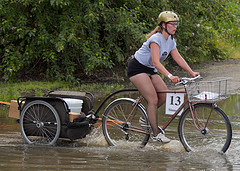 If there’s any certainty to travel it’s this: travel is uncertain. Every year, travelers around the world are stranded by disasters abroad.
If there’s any certainty to travel it’s this: travel is uncertain. Every year, travelers around the world are stranded by disasters abroad.
It can be difficult if not downright impossible to predict what events you may encounter when you travel. There are, however, some common sense strategies that travelers can use to avoid a worst-case travel disaster of epic proportions.
The following are 4 tips to getting home safely when you’re in danger of being stranded abroad.
1. Know before you go
Take a little time before you settle on your trip plans to know the risks before you go. Taking care to check the local weather conditions and the current travel warnings.
See the country-specific information available on the State Department’s website for safety and security risks as well as crime information. It’s a good place to start to learn about where you’re going before you get stuck.
2. Avoid total digital blackout
While it’s tempting to shut off completely and avoid current events, it’s still important to maintain some contact so you know what’s happening where you’re traveling should something go wrong. This is where you might consider the U.S. State Department’s Smart Traveler Enrollment Program, or STEP, a useful tool.
When you sign up, you’ll indicate where you are traveling and when and you can add or delete trips based on your current travel plans. Once you indicate travel plans, you’ll receive the current information about the region to where you are traveling – helpful for #1 above.
During your travel dates, you’ll also receive travel alerts and travel warnings appropriate to your destination. STEP makes it easier for officers in the U.S. embassies and consulates around the world to contact you and those back home during an emergency. As they say, a well-informed traveler is a safe traveler.
3. Get out before the going gets bad
Some natural disasters hit without much in the way of warning, so this one is tricky. If you are aware of an impending risk, it’s better to evacuate early rather than waiting for others to evacuate you. This is where travel insurance plans with non-emergency medical evacuation coverage can be handy.
The covered reasons for non-medical, security, or political evacuations typically include:
- Natural disasters – like a hurricane or earthquake
- Civil uprisings, military coups, or political unrest
- Identification as a persona non grata or being expelled from the country you are visiting
That last one is a bit peculiar, but in essence, it means you are officially asked to leave a country you are visiting.
It’s important to note that the travel insurance provider is the one to determine whether an evacuation is a covered event or not, based on the circumstances and the terms of your plan. In addition, you may not be evacuated immediately home, but to a place of safety first.
4. Take cover when it hits and be realistic
The Federal government does not automatically send out rescue teams for their citizens caught in disasters. Even when transportation is made available, it’s paid for by those who are rescued. In March of 2011, after the nuclear crisis in Japan, the State Department sent chartered planes to evacuate U.S. civilians who wanted to leave, but changing weather conditions caused delays.
Once a disaster hits, take cover immediately and pay attention to the orders from local authorities. You can’t assume that help will be immediately at hand when a disaster strikes, but if you’ve done your homework and purchased the right travel insurance, you can get in touch with the assistance services team for information and advice.
If you are unable to access the Internet due to blackouts or get through on your cell phone, having family members or friends back home with your travel itinerary and travel insurance documents on hand is a great backup.
Remember that SMS or text messages often get through when voice communications are jammed. In some cases, those back home have better access to information about unfolding events that you do on the ground, so stay in touch.
